
|   |

|   |
The politics of death - Padma Jayaraj e-mail: padmajayaraj@gmail.com Photos: O. Ajithkumar February 18, 2015 The 7th Edition of International Theatre Fest of Kerala (Jan 10 to 17, 2015) showcased the theme of resistance. Theatre makers, actors, directors, producers, musicians, and back stage staff from Lebanon, Syria, Palestine, Egypt, Sri Lanka, Bangladesh, Singapore, Malaysia, Indonesia and India shared their existential and artistic concerns in various sessions. Zoukak Theatre Company from Lebanon brought 4 productions. They opened a window for the viewers to see how theatre of resistance works against all odds in Lebanon. The politics of death is exposed in their plays as an epic resistance for righteousness. At the artistic level, their plays brought into focus probing questions on the rationale of theatre 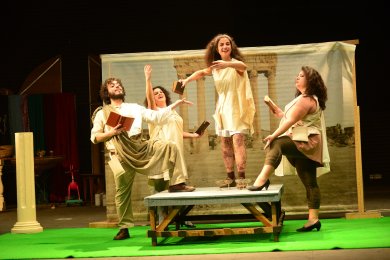
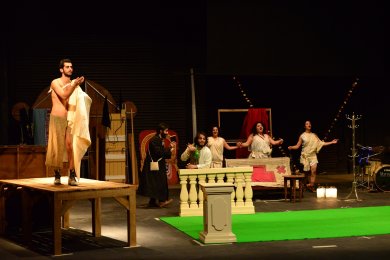
Lucena
The fest began with ‘Lucena’ (Obedience Training), a theatre performance based on Ibsen’s ‘Emperor & Galilean.’ Superbly directed, the play traverses through different stages of civilization: from ancient Greece to present day Middle East highlighting the topicality of the play with world -wide implications. The Biblical “Render unto Caesar what is Caesar’s and unto God what is God’s,” is thrashed in and out to identify the politics of State and Religion conniving to rob everything from the people of the land. Built on parallelism and abstraction, the drama reverberates with human history. Apparently, it is the story of a drama troupe at training for the rehearsal of a play led by the director. The stage is the studio where the director is shaping the intonation and modulation of the voice of the actors and their body language. In no time, when the director feels that he is satisfied with the job the meaninglessness of training emerges as a mockery frustrating his attempt. And the stage is set for confrontation in the hierarchy of theatre with its parallels in politics and religion down the history of civilizations. Music, singing, and dance render local colour to a global phenomenon. The director and the actors taking the audience into confidence, although Brechtian dramatic technique, is a remarkable feature of the play as the story unravels on the stage. We pass through periods and places as the statue prominently placed on the stage, in an array of different costume indicates the politics of the states concerned. In ancient Greece, gods ruled when priests were power centres, the Statue of Apollo testifies to it. It was Emperor Constantine who declared Christianity as the state religion. Ironically, the consequence is seen in the statue donning the costume of the Roman god of War, Mars. The character Julian in the play is found enjoying wine in philosopher Maximus’ home and the statue is now Bacchus, the god of wine. As we hear music associated with church in the background, we sense the undercurrent of the wine from the cup of Bacchus flowing as the wine in the ceremonial Christian ritual in the time of Constantine. Meanwhile resentment and dissent in the drama troupe forces the actor who plays Julian to confront the director in a struggle for freedom of expression. The fight ends in the actor killing the director. And the actors transform themselves into historical personage and the stage to historical times. We find in Roman politics women are just singers, dancers and pawns in the struggle for power. Armies march to establish power devastating land and people who have to ‘render unto Caesar what is Caesar’s …..’ Julian usurps power to establish polytheism in Rome. At another level, we feel the change of the locale. The stage rings with the divisive politics of the Middle East. The power centre donning the mask of an animal unleashes violence. A series of cultural icons of the Middle East flit past as the costumes of the statue change in rapid succession. The chorus who sang the praise, turn like furies and smother the animal king. The abstract end is a master stroke, prophetic and poetic. The success of theatre is when the real drama happens in the mind of the audience. Living in the multicultural milieu of India where democracy is the rule of the land it is interesting to find the drama of religion, and caste shaping power politics. So the sequel of ‘Lucena’ goes on in our mind, in the news that we read and analyze every day. Power politics over the millennia has not changed whatever be the political situation, autocracy or democracy. The only panacea is resistance. 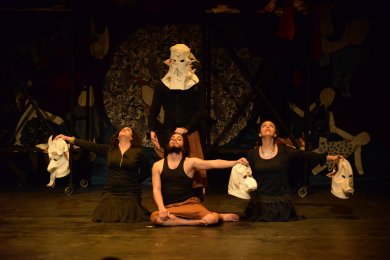 He who saw everything
In The Epic of Gilgamesh, the great king falls into deep grief, recognizing his own mortality through the death of his friend and questions the meaning of life and the value of human accomplishments in the face of ultimate extinction. Casting away all his old vanity and pride, Gilgamesh sets out on a quest to find the purpose of life and finally, some way of defeating death. In doing so, he becomes the first epic hero in world literature. The grief of Gilgamesh, and the questions his friend's death evoke, resonate with every human being who has wrestled with the meaning of life in the face of death. To an Indian mind the parallel is Emperor Asoka and his political philosophy of Ahimsa, which Gandhiji left as his legacy to the world. Since The Epic of Gilgamesh became popular in oral form, singing format suits its rendering. The haunting refrain and the lilting cadence to the beat of folk rhythm are compelling even when its meaning does not reach a foreign audience. The Arabic lament strangely recalls the ritual wailing of rural India. The setting has a tree in the background, The Tree of Life. And the drama starts with a mourning scene. The dead young man on the lap of his shocked brother is the present day reality in Lebanon. The use of the mask and singing mode stirs up the search of Gilgamesh in epic times. Gilgamesh is represented with the bull in ancient cuneiforms. In the days before monotheism lambs were sacrificed to gods. The sacrificial lambs at the altar of gods are replaced today by men at the altar of power. As the sons of the land are sacrificed for the sake of religion, the land mourns; mothers bewail. Death means the loss of life, the negation of the very purpose of life and its meaninglessness lies in glorifying death. “By default, Lebanon is the place where death is starkly real,” said Lamia, one of the team members of Zoukak Theatre Company. ‘Death comes through eyes’ is an intense play on the theme of death. The play when it speaks of what happens in Lebanon today is questioning the attitude of the people who accept the reality of political killings with icy nonchalance. The play questions not just the political use of death, but the attitude of accepting it indifferently. It highlights the lack of concern which is inhuman and criminal. As the play opens we find the living room of a house where there is a framed picture that troubled the conscience of humanity recently. A bigger version of the same picture is kept above and finally the larger screen version of the same on the TV screen sets the tone and tenor of the play. The familiar picture of a child moving towards death in epidemic ravaged Africa watched by a hungry vulture waiting to pounce on him is invested with symbolic significance. We have grown used to it, the stories of death in the news media; we watch it just like we watch horror movies. The woman seated has a smiling face that shocks and hurts the sensibility of the viewer. Slowly we understand the smiling face symbolizes the casual attitude to the news of death at the doorstep day after day, the lack of feeling and concern for fellow beings. She eats her dinner and drinks her wine as if nothing happened. The smiling face is juxtaposed to her grim-faced companion who enacts in tableau the tragic reality of death on a raised platform nearby. The famous photographs that got imprinted in human consciousness through years of mass extermination in different points of time and place in recent history are brought out in tableau. Listing of dates and locales gives a wide canvas to the theme of genocide from Vietnam, Cambodia, Bosnia ....to various places in Middle East. Cultural icons like the Pieta, the Madonna scream in silence. Finally, on the raised platform the grim faced woman enacts her own death. The tableau reminds you of the training that the suicide bombers receive. One is meant to confront oneself in such a set up where violence is the norm. It is shocking portrayals of a lived reality. The artist conveys the brutality and authenticity of actuality not far away from us. 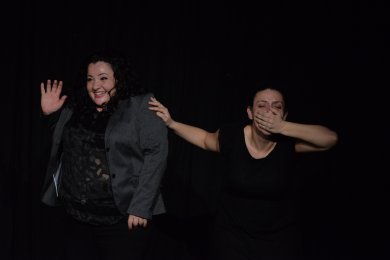 Death comes through eyes 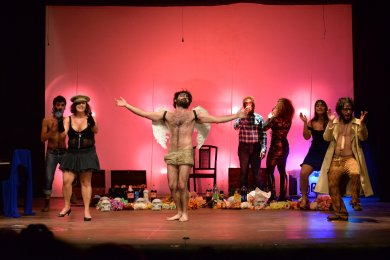 I hate theatre but love pornography ‘I hate theatre but love pornography,’ the concluding play of the theatre fest by Zaukak brought under scanner another aspect of the present day reality, criminal indifference of people who are just automatons devoid of humanity. And from theatrical point of view the problem of viewing is highlighted. The scene begins with the piercing cry from beyond. But on the stage women actors voluptuously dressed sing welcome songs. The dancing body movements and the revealing costumes are meant to tickle and provoke the viewers. The banal sensuality that underscores sexuality is an escape from reality. Serious theatre is a different art that makes you think and confront. The crying bird lies in the centre of the stage now. Around the wounded bird the sensual dance reveal other layers. The dividing line between bathos and pathos gets blurred. The narrative traces the stream of news: news of explosions, of car-bombs, of chemical weapons, of rapes, of killings, of refugees as words acquire irony and sarcasm. Meanwhile a mass grave slowly comes to the fore with babies as causalities. The wounded dove, the symbol of peace, with its broken wings at the point of dagger revolves in a tableau in the centre under glaring arc lights. Theatre on the one side, pornography on the other side is a strange situation that shows the state of art and theatre today and the public attitude. The actors come on stage, put the dolls that represent babies on their laps. They sing a lullaby with the familiar rhythm of nursery kids learning alphabets and numbers, or like songs that tell of stories of long ago to put them to sleep. His-story, long ago and far away!! Oh why this needless killing…? The play ponders on many questions. From theatrical point of view, the problem of viewing; what is the purpose of theatre? From the philosophical point of view it highlights human tragedy as life goes on perennially….in the context of inexorable time. Where are the glory and the dream, set against the socio-political realities? What does the mindless tragedy mean in the context of human history? Not even the inheritance of a sense of loss. The powerful ending of a disturbing play is the message of the entire theatrical presentation of the theatre company Zoukak from Lebanon. Man is born as a man but dies as an animal, that we must first work in such a way as to restore ourselves to a human level of existence where speaking the truth is a natural thing. Living happily with what we have becomes a natural thing. All the other things - helping others, being compassionate, being loving, being merciful - all these must become a natural thing, not something to be learned from books of religion, but from within, perhaps through social teachings, hence the mission of Zoukak. Zoukak Theatre Company, Lebanon, founded in 2006 practice theatre as therapy for political and social involvement and action. Based on collective work done by diverse individuals the troupe tries to connect social interventions with artistic investigations. Working in precarious conditions on politically sensitive issues speaks volumes of their commitment as artists. Padma Jayaraj is a freelance writer on the arts and travel. She is a regular contributor to narthaki.com |